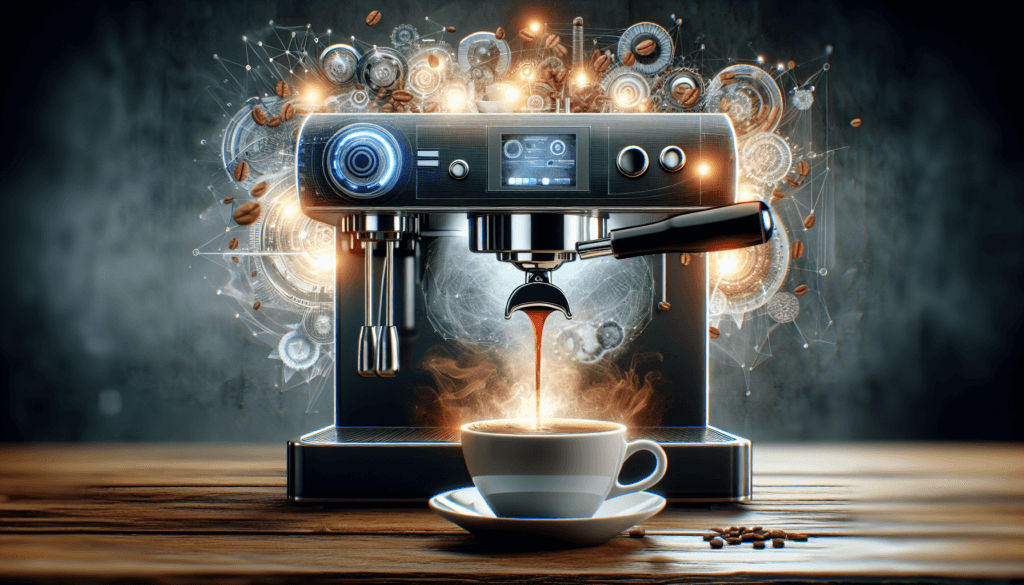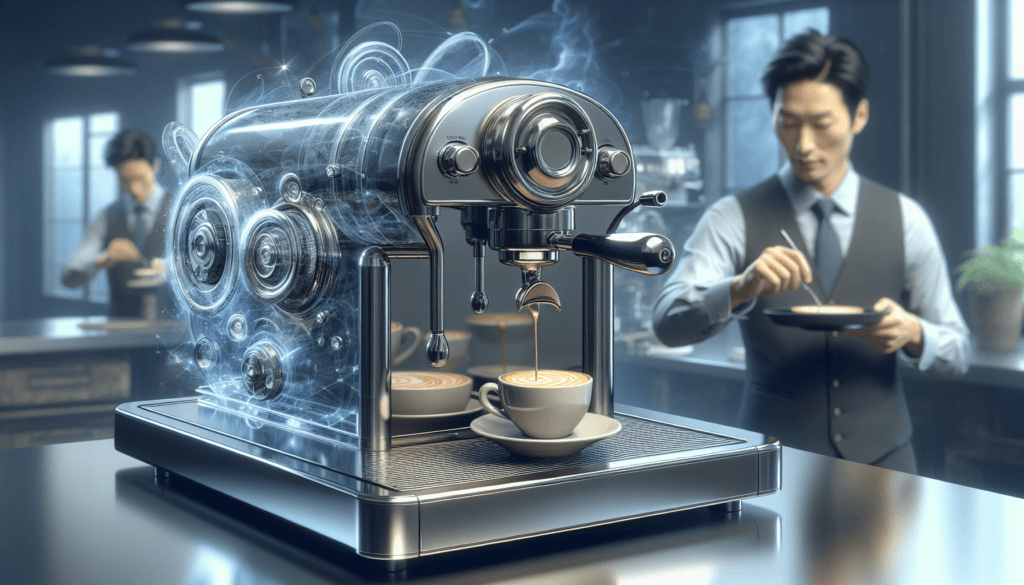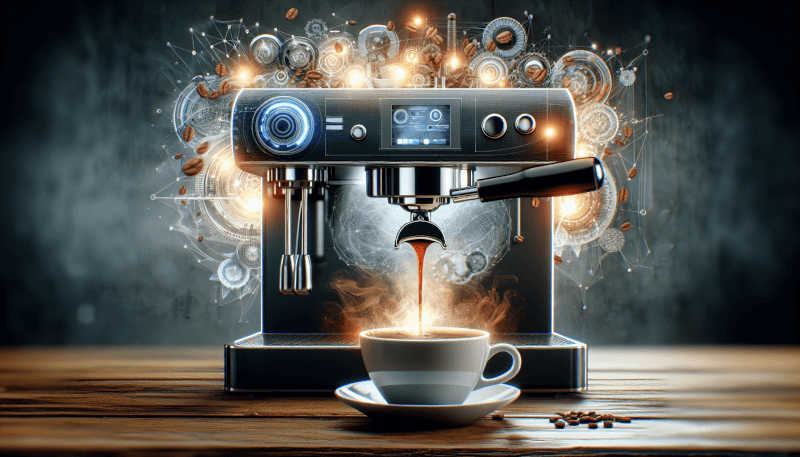Are you tired of long wait times and inefficient coffee service at your favorite café? Look no further! In this article, we will explore the best practices for achieving an efficient and streamlined coffee service that will leave you with a perfect cup of coffee in no time. From optimizing the layout and workflow of your coffee bar to implementing effective communication strategies, these tips and tricks will help ensure a seamless experience for both baristas and customers alike. Say goodbye to slow service and hello to a fresh, hot cup of coffee without the hassle. Let’s dive in!

Layout and Design
Store Layout
The store layout plays a crucial role in creating an inviting and efficient coffee shop environment. When designing the layout, it is important to consider factors such as traffic flow, seating arrangement, and the placement of service areas. By strategically positioning the brewing and serving areas closer to the entrance, you can maximize customer convenience and minimize wait times. It is also important to create comfortable seating areas that promote relaxation and encourage customers to stay longer.
Equipment Placement
The placement of coffee shop equipment is a key factor in ensuring a smooth workflow and efficient service. By carefully arranging the espresso machine, coffee grinders, and other equipment, you can create a streamlined process for baristas and minimize any unnecessary movements. Placing the equipment within easy reach of the workstations will enable baristas to prepare beverages quickly and efficiently, reducing waiting times for customers.
Efficient Workflow
Efficiency in coffee service relies heavily on a well-organized workflow. By implementing clear processes and procedures, you can ensure that tasks are completed in a timely manner and reduce the chance of errors or delays. This includes assigning specific roles and responsibilities to staff members, such as taking orders, preparing beverages, and handling cash transactions. Training your staff on efficient workflow practices will also contribute to a smooth operation and overall customer satisfaction.
Staff Training and Organization
Training Programs
Providing comprehensive training programs for your staff is essential to ensure consistency and high-quality coffee service. These programs should cover everything from coffee brewing techniques to customer service skills. By investing in staff training, you can empower your employees to confidently handle any situation and deliver exceptional service to every customer. Ongoing training sessions and workshops will also help keep your staff up to date with the latest trends and techniques in the coffee industry.
Task Delegation
Effective task delegation is key to maximizing productivity and maintaining an organized coffee shop environment. By assigning specific duties to each staff member, you can ensure that all tasks are completed efficiently and no aspect of the operation is overlooked. This includes responsibilities such as restocking supplies, cleaning equipment, and monitoring inventory levels. Regularly reviewing and adjusting the delegation of tasks will help identify areas that may require additional support or improvement.
Communication
Open and clear communication among staff members is fundamental in a well-functioning coffee shop. Establishing effective communication channels, such as staff meetings or digital communication platforms, encourages teamwork and ensures that all staff members are informed and aligned with the goals and objectives of the business. Regularly checking in with your team and providing opportunities for feedback and suggestions will foster a positive work environment and contribute to a more efficient operation.
Inventory Management
Supplier Relationships
Maintaining strong relationships with your suppliers is essential for efficient and cost-effective inventory management. By working closely with reliable suppliers, you can ensure a steady and consistent supply of high-quality coffee beans, dairy products, and other essential ingredients. Regular communication with your suppliers will also help you stay informed about any changes in pricing or availability, allowing you to proactively manage your inventory and prevent any potential disruptions in your coffee service.
Stock Control
Implementing effective stock control measures is crucial for managing inventory efficiently. This includes regularly monitoring and tracking stock levels to avoid excessive waste or shortages. Utilizing inventory management software can streamline this process by providing real-time updates on stock levels and enabling you to set automatic reorder points. By analyzing past sales data and seasonal trends, you can also optimize your inventory management strategy and minimize any unnecessary costs or losses.
Waste Minimization
Minimizing waste is not only beneficial for your bottom line but also for the environment. Implementing practices such as portion control, proper storage techniques, and regular inventory checks can help reduce food and beverage waste. Additionally, offering customers the option to customize their orders allows them to choose the precise amount of ingredients they prefer, reducing the likelihood of unused or discarded items. By prioritizing waste minimization, you can contribute to a more sustainable coffee shop operation.
Menu Selection and Specialization
Customer Preference Analysis
Understanding your customers’ preferences is key to creating a menu that caters to their tastes and demands. Regularly analyzing customer feedback and tracking sales data can provide valuable insights into which items are popular and which may need improvement or removal. Gathering feedback through surveys or social media interactions can also help identify any specific preferences or dietary restrictions that your customers may have. By leveraging this information, you can refine your menu selection and ensure it resonates with your target audience.
Limited Variety
While offering a wide variety of options may seem appealing, it can actually hinder efficiency and quality. By focusing on a more limited menu, you can streamline your operations and optimize ingredient inventory. This allows your staff to become experts in preparing a select range of beverages, resulting in consistent and high-quality drinks. Limited variety also reduces decision-making time for customers, enabling faster service and reducing potential bottlenecks during busy periods.
Signature Drinks and Specials
Adding signature drinks and seasonal specials to your menu can create excitement and encourage repeat visits from your customers. By regularly introducing new and unique beverages, you can showcase your creativity and differentiate your coffee shop from competitors. Promoting these signature drinks through digital platforms and in-store displays will generate curiosity and entice customers to try something new. Highlighting special offers and limited-time promotions can further increase customer engagement and drive sales.

Quality Control
Bean Selection and Storage
The quality of coffee beans directly impacts the taste and overall experience of your beverages. Establishing relationships with reputable coffee bean suppliers will ensure a consistent and high-quality product. When selecting beans, consider factors such as origin, roast profile, and flavor notes to cater to a variety of palates. Proper storage of coffee beans is also crucial to maintain their freshness and flavor. Using airtight containers and storing beans in a cool, dry place away from direct sunlight will help preserve their quality for longer.
Grinding Techniques
Consistency in coffee grinding is essential for achieving optimal flavor and extraction. Implementing proper grinding techniques, such as using a calibrated grinder and adjusting grind size based on the brewing method, will result in a more uniform extraction and balanced flavor profile. Regularly calibrating and maintaining your grinders will help ensure a consistent grind size and prevent any potential issues in the extraction process. Training your baristas on proper grinding techniques will contribute to a more consistent and high-quality coffee service.
Brewing Methods
Mastering different brewing methods allows you to offer a diverse range of coffee experiences to your customers. Whether it’s pour-over, espresso, or French press, each brewing method requires specific skills and attention to detail. Training your baristas extensively on each brewing method will ensure that they can consistently deliver the best possible result for each customer’s chosen beverage. Regularly reviewing and refining your brewing techniques based on customer feedback will help elevate the overall quality of your coffee service.
Technology and Automation
Point of Sale Systems
Investing in a modern and efficient point of sale (POS) system can significantly enhance your coffee shop’s operations. A POS system allows for seamless order processing, accurate inventory tracking, and efficient cash management. Features such as customer relationship management and sales analytics can also provide valuable insights into customer preferences and help you make data-driven decisions. By automating routine tasks and streamlining the ordering process, a POS system empowers your staff to focus on providing exceptional service and improves overall efficiency.
Automated Brewing Equipment
Utilizing automated brewing equipment can simplify and standardize the coffee preparation process. These machines are designed to optimize extraction, maintain water temperature, and ensure consistent results. Automated brewing equipment reduces the reliance on manual intervention, allowing baristas to focus on other tasks, such as customer service and drink customization. However, it is important to strike a balance between automation and the craft of coffee making to preserve the artistry and authenticity of the coffee experience.
Digital Ordering Platforms
Offering digital ordering platforms, such as mobile apps or online ordering, can enhance the convenience and efficiency of your coffee shop. Customers can place their orders in advance, minimizing wait times and allowing for a quicker pickup. Integrating these platforms with your POS system ensures accurate order processing and seamless inventory management. Additionally, digital ordering platforms enable you to collect valuable customer data, providing insights into purchasing patterns and allowing for targeted marketing campaigns.

Customer Service
Fast and Friendly Service
Providing fast and friendly service is essential for ensuring customer satisfaction and loyalty. Focusing on minimizing wait times and delivering efficient service demonstrates that you value your customers’ time. Staff members should be trained to greet customers with a warm and welcoming demeanor, actively listen to their preferences, and deliver their orders promptly. By truly understanding and anticipating your customers’ needs, you can create a positive and memorable coffee shop experience.
Personalization
Going the extra mile to personalize the coffee shop experience can leave a lasting impression on customers. This can include remembering regular customers’ preferences, offering drink recommendations based on individual taste preferences, or even adding a handwritten note alongside their order. Training your staff to engage with customers on a personal level fosters a sense of connection and loyalty. By building a rapport with your customers, you can establish a strong customer base and generate positive word-of-mouth referrals.
Loyalty Programs
Implementing a loyalty program can incentivize repeat business and reward loyal customers. Whether through a points-based system or exclusive discounts, loyalty programs create a sense of value and appreciation for your customers. Utilize technology, such as a digital app or loyalty card, to make it easy for customers to track their rewards and stay engaged. Regularly communicating with your loyal customers about exclusive promotions or new offerings further strengthens their connection to your coffee shop and encourages continued patronage.
Maintenance and Cleaning
Regular Equipment Cleaning
Proper maintenance and regular cleaning of coffee shop equipment are vital for ensuring the longevity and optimal performance of the machines. Establish a cleaning schedule that includes daily cleaning tasks, such as wiping down espresso machines and steam wands, and weekly or monthly deep cleaning tasks, such as descaling and backflushing. Regularly inspecting equipment for any signs of wear or malfunction and addressing issues promptly will help prevent costly repairs and service disruptions.
Preventive Maintenance
In addition to regular cleaning, implementing a preventive maintenance program for your coffee shop equipment is essential. This involves scheduling routine maintenance checks and servicing by qualified technicians to identify and address any potential issues before they become major problems. Preventive maintenance not only extends the lifespan of your equipment but also ensures that it consistently operates at its optimal performance, minimizing downtime and interruptions to your coffee service.
Sanitation Practices
Maintaining high standards of sanitation is critical in the food and beverage industry, including coffee shops. Establishing strict sanitation practices, such as regular handwashing, glove usage, and routine cleaning of surfaces, helps prevent foodborne illnesses and ensures the health and safety of both staff and customers. Train your staff on safe food handling practices and implement proper waste disposal protocols to maintain cleanliness and hygiene throughout your coffee shop. Regularly monitoring and enforcing these sanitation practices will help create a safe and inviting environment for everyone.

Sustainability Practices
Composting and Recycling
Integrating composting and recycling initiatives into your coffee shop’s operations demonstrates a commitment to sustainability. Implementing separate bins for organic waste, such as coffee grounds and food scraps, enables the composting of these materials, reducing their environmental impact. Similarly, providing dedicated bins for recyclables, including paper cups and plastic bottles, encourages responsible waste management. Partnering with local composting or recycling facilities can ensure that these materials are properly processed and diverted from landfills.
Reusable Cups
Encouraging the use of reusable cups is a simple yet impactful way to reduce waste. Offer incentives, such as discounts or loyalty program points, to customers who bring their own cups or tumblers. By making reusable cups readily available for purchase and prominently displaying them in your coffee shop, you can remind customers of the environmental benefits and convenience of using their own containers. Educating your customers about the impact of disposable cups and the value of reusable options further promotes sustainable practices.
Energy Efficiency
Reducing energy consumption not only benefits the environment but also contributes to cost savings. Implement energy-efficient practices throughout your coffee shop, such as utilizing LED lighting, installing motion sensor switches, and investing in energy-efficient equipment. Optimize temperature control systems and make use of natural lighting and ventilation whenever possible. Regularly monitoring energy usage and establishing benchmarks can help identify areas for improvement and encourage ongoing energy conservation efforts.
Marketing Strategies
Branding and Consistency
Creating a strong brand image is essential for establishing a loyal customer base. Develop a clear and distinctive brand identity that aligns with your coffee shop’s values and targets your desired customer demographic. Incorporate your brand elements consistently across all customer touchpoints, including signage, menus, packaging, and online presence. Consistency in branding helps create a recognizable and memorable identity that resonates with customers and sets your coffee shop apart from competitors.
Social Media Presence
Utilize social media platforms to promote your coffee shop and engage with customers. Regularly share visually appealing content, such as high-quality photos of your beverages or behind-the-scenes glimpses of your coffee making process. Encourage customers to share their experiences and reviews on social media, using relevant hashtags or geolocation tags. Engaging with customers through social media platforms allows for direct communication, builds brand awareness, and helps attract new customers through positive online interactions.
Partnerships and Collaborations
Collaborating with other local businesses or organizations can create mutually beneficial opportunities for exposure and growth. Seek partnerships with complementary businesses, such as bakeries or local farmers, to offer joint promotions or feature their products alongside your coffee offerings. Collaborating with community organizations or hosting local events can also engage customers and strengthen your coffee shop’s ties to the community. By leveraging partnerships and collaborations, you can expand your customer base and establish your coffee shop as an integral part of the local ecosystem.
In conclusion, implementing these best practices can streamline and optimize your coffee shop’s operations, enhance the overall customer experience, and set your establishment apart from competitors. By prioritizing factors such as efficient layout and design, staff training and organization, inventory management, menu selection and specialization, quality control, technology and automation, customer service, maintenance and cleaning, sustainability practices, and effective marketing strategies. Embracing these practices will ensure that your coffee shop operates smoothly, efficiently, and successfully, resulting in a loyal customer base and continued growth.



